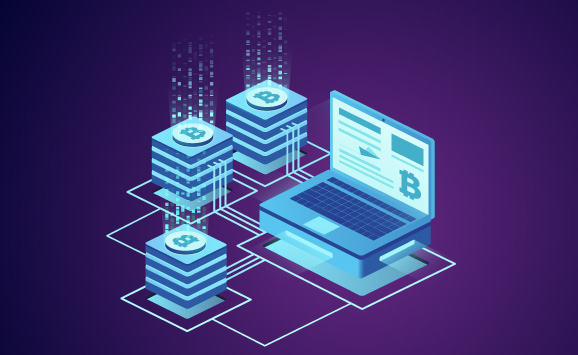Blockchain explained in 7 minutes
Maybe you’ve wondered at some point, “What even is blockchain?”


So what are blockchains?
A blockchain is a decentralized ledger — a digital record of transactions amongst a network of people. Think of a shared diary amongst a group of people, where what happens between them is recorded each day. Once an event has been recorded and accepted by everyone in the group, it becomes difficult to change as more items are recorded.
Blockchain allows for an unlimited number of anonymous parties to store information privately and securely, using software algorithms instead of a central authority. As the name suggests — Blocks are what store groups of data e.g. transactions. A series of blocks together form a Chain, which is distributed amongst the network.
So is blockchain the same as crypto?
There’s a common misconception that blockchains are a cryptocurrency — however the blockchain is the technology that supports it. Cryptocurrency is created and stored electronically in blockchains, using encryption techniques to control the creation of monetary value, and verification of the transfer of funds. For instance, some cryptocurrencies you may have heard of such as Bitcoin, Ethereum or Dogecoin, all run on their own separate blockchains.
Let’s go through step by step how a transaction is facilitated and recorded on the blockchain:
- A member of the network submits a transaction.
- The requested transaction is shared with the peer-to-peer network of computers (known as nodes).
- Validation of the transaction occurs through the network of nodes, using known algorithms, to confirm the status of the transaction.
- A verified transaction can involve the use of cryptocurrency, records, smart contracts, and other information.
- The transaction is verified and combined with other transactions to form a Block using hashing.
- The Block is added to the existing blockchain in a way that is unable to be altered or tampered with.
So what’s so revolutionary about blockchain?
There are several key benefits of blockchain, which make the technology and the products built on it unique to other types of digital databases. For example, blockchain is:
-
- tokenised — the value of an asset is tokenised and stored on the blockchain. With no physical form and existing only on the network, it is difficult to create counterfeit goods, funds or double-processing of transactions.
- decentralised — blockchain enables a peer-to-peer network that is not controlled by a central bank or authority, enabling greater security and privacy. Information sharing is not controlled by one key person or organisation.
- immutable and unalterable — transactions and records cannot be reversed, or tampered with.
This is vastly different to traditional finance and as such, provides a few core benefits. For example, there’s improved:
- privacy and identity verification — identity is typically a key target for fraud in traditional finance, and blockchain technology ensures identifying a participant of the network is traceable and verifiable at rapid speed. Rules and permissions implemented on the blockchain can manage participants in the network and their role.
- security — a malicious attack on a bank would require targeting a centralised network or server. However, with blockchain technology, each node in a peer-to-peer network acts like its own server. It’s much more difficult to compromise a network as it can verify transactions against other nodes. As such, information about your identity, funds and transactions cannot be easily obtained.
So will blockchain revolutionise my life?
You may have come across stories like Bitcoin consuming more energy than Norway or that some governments are so sceptical of cryptocurrency that they’ve made it illegal. So why do we keep using and investing in tech that causes so much controversy?
There are industries and use cases where it’s beneficial to use decentralised networks, for example:
Transparency in supply chains
Industries such as fashion, luxury goods, and pharmaceuticals have had years of issues with tracking products, creating transparency and building trust in authentic products. Research and applications of blockchain have helped with verifying authenticity, provenance and traceability. This includes reducing the amount of information flow between multiple parties when dealing with inventory, financials, and information, which could also reduce the need for lengthy human auditing. These can translate to commercial and sustainable benefits, for example knowing you’ve purchased the real deal in the luxury goods sector, or traceability of pharmaceuticals to remove counterfeit drugs, which cause a million deaths a year.
Casting your vote digitally
You may have at some point Googled ‘when will we know the result of the US election’ and waited with bated breath as votes were counted and recounted. There’s been a recent push to move voting to digital systems, particularly using blockchain and facial recognition systems. It’s still early days, with many wary of the technical risks and vulnerabilities of on-chain voting, and the challenge of explaining to the general public what blockchain is (it’s taken us a few hundred words just to cover the basics!).
Creating social good
More use cases are emerging where not-for-profit organisations are using blockchain technology to ensure funds can be donated and used in more transparent ways. There have also been more examples of people supporting causes using cryptocurrencies — The Giving Block is one start-up gaining momentum.
Blockchain has the potential to create radical change for commercial, sustainable, and social good.. Whilst it requires considerable commitment of resources, innovation and transformation, blockchain has proven to be a powerful tool in many industries. Maybe we’ll all be ‘on-chain’ one day and getting married with NFT rings, but until then keep learning through more Codora blogs.
A blog by Codora and Atlas DEX.


